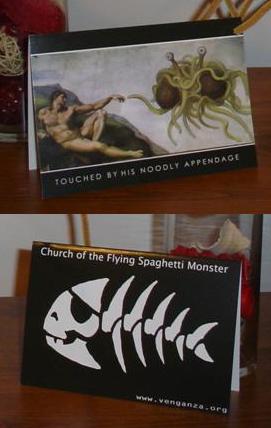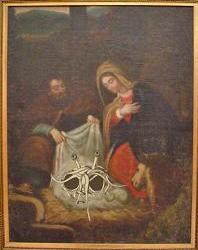 Faith & Science
Faith & Science
“Celebrating” Christmas at the “Church of the Flying Spaghetti Monster”
During the holiday season, many Americans take time to seriously and respectfully reflect on Judeo-Christian religious beliefs. Not so for one website, the “Church of the Flying Spaghetti Monster” (FSM), a pro-evolution satire against intelligent design. They exhibit no interest in treating Christian holidays with respect. To celebrate the season, they are selling Christmas cards which show a dead Christian fish symbol. Other Christmas Cards portray Michelangelo’s well-known “Creation of Adam” painting on the Sistine Chapel, but the FSM cards have God replaced by the “Flying Spaghetti Monster.” Another graphic promoted on the page shows a nativity scene where Jesus is replaced by the “Flying Spaghetti Monster.” I can appreciate humor, but it’s also clear that the FSM images are intended to mock traditional religion:
Sample Imagery on the “Flying Spaghetti Monster” Website which Mocks Judeo-Christian Religion:
 |  |
What is the “Flying Spaghetti Monster”?
For those who don’t already know what “FSM” is all about, according to the London Guardian’s FAQ on intelligent design, “Flying Spaghetti Monsterism” is “a satirical ‘religion’ created by Bobby Henderson, a physics graduate of Oregon State University.” The website reports that FSM began when Henderson “wrote to the Kansas Board of Education in June 2005, alerting them to the many people who believe that a Flying Spaghetti Monster created the universe, and demanding that science lessons be split three-ways: ‘One third time for intelligent design, one third time for Flying Spaghetti Monsterism, and one third time for logical conjecture based on overwhelming observable evidence.'” The FAQ then explains that “Henderson’s point is that the concept of a Flying Spaghetti Monster is every bit as rational a concept as intelligent design.”
Also known as “Pastafarianism,” FSM is obviously a satire and a joke. As such, I can appreciate the humor and I will admit, even though I am a Christian with a Jewish heritage, sometimes the FSM website really makes me laugh. But there’s a deeper issue here. Aside from the anti-Christian Christmas cards, the FSM website sells “The Gospel of the Flying Spaghetti Monster,” which is a mockery of the Christian New Testament. Anyone who has ever studied the paraphernalia in a Christian bookstore will recognize that the FSM shirts with dead Christian fish symbols and the word “Truth” are mocking Christianity. They even sell an FSM car icon to mock the “Jesus fish” icon. I’ve seen a couple FSM car icons on the road here in Seattle. It’s funny, but clearly the FSM concept aims to mock those who seriously believe in Judeo-Christian religious views.
“Academic Endorsements”
Yet FSM is reportedly “endorsed” by about 50 Darwinist academics, who presumably see nothing wrong with this mockery of religion. Below are some of the comments from the scientists and other academics who have apparently written to Bobby Henderson to express support. While it’s easy to play along and laugh about all of this, consider also the mindset of these Darwinist scientists and other academics as they write their comments:
- Steve Lawrence, PhD wrote: “He has created the fundamental subatomic particles that form all matter in this universe in His own quivering image! You, me, the Earth, the stars…everything in the universe…are all built of trillions of tiny jiggling noodles, microscopic copies of our Divine Saucy Maker. Truly He is everywhere and in all things!” Similarly, Darwinist Brandon Beierle, Ph.D. concluded his comment saying, “Truly we are blessed to be the product of His Noodly Appendage!”
- Chris Westbury writes, “Flying Spaghetti Monsterism may well provide the solid basis on which the good children of Kansas can build a just, rational, and virtuous life.”
- Darwinist author and scientist Stephen D. Unwin appears to initially defend Christianity but then claims that FSM is a better choice: “I hope no one confuses the terrible and naïve notion of ID with what it means to be Christian. In a way, ID represents a very flawed unChristian God who was incompetent to the task of creating capable natural laws, and so resorted to post-creation tinkering, thus giving the impression of supernatural design. Yet, if supernaturalism be called for, then the pasta family of theologies seems the most plausible, and unquestionably the tastiest with cheese.”
- Charles E. M. Dunlop, Ph.D, heaps praise upon FSM in a fashion which mocks traditional theistic religion. “Close observers of human behavior will note that Italians have long de facto recognized pastafarianism as a serious competitor to Catholicism, practicing the former more frequently and with even greater gusto” and concludes with a unique take on a famous verse from the Gospel of Matthew: “With Him all things are pastable.” (I have to admit that I laughed when I read that.)
- Simon Harrison Chen, Lic. (London, UK) writes, “FSM-ism would do no harm, and be a tasty alternative for fanatic Christianism.”
- Jobst Meyer, PhD, Professor of Behavioral Genetics, claims that FSM and traditional theism are no better than “the invisible pink rabbit hypothesis” and Philip Nel, Ph.D., Associate Professor of English, Kansas State University compares belief in traditional theism to “the Church of the Invisible Pink Unicorn.”
- Guy Davies, Ph.D., Computer Science of the Royal Institute of Technology attacks the clergy, saying that “intelligent design would more efficiently be forced on innocent minds through the use of professional sales personal, spin doctors, Hollywood writers, politicians or priests.”
- G.S. Barkin, Ph.D, Asst. Professor of Anthropology says, “[I]t was also revealed to me, by the noodly touch of our divine-alicious creator, that His whimsical deception runs dee[p]” and concludes by pitting religion against reason, writing that “only when one denounces logic and reason themselves that the saucy veil is lifted, and the noodly Truth is made plain.”
- Alison Bernstein writes that “FSM is as good a set of beliefs as any religion,” and, like many of the commenters, Ann M. Körner, who received her Ph.D. in Biophysics and Biochemistry from Yale University, concludes her remarks with a resounding “RAMEN.” (Again, it’s witty, but remember the mindset of these people.)
Finally, there is an “academic endorsement” from someone named “E. Scott”:“Pastafarianism attempts to explain the origins of the universe, and does so with as much or more validity (and more gusto!) than ID creationism. And maybe many people find a sense of ultimate purpose in the universe by believing in the Flying Spaghetti Monster. But such beliefs are based upon faith, not science. In fact, considering His active distortions of observable data, science cannot comment upon these beliefs at all, and must proceed in it’s usual manner — testing hypotheses based upon observable data. Whether these data have been altered by His Noodliness is moot; a difference which makes no difference is not difference. … I’m off to The Old Spaghetti Factory for worship.”
While much of this is witty and fun, these comments reveal an underlying anti-religious mindset by these Darwinist academics who “endorse” FSM in a tone which mocks traditional Judeo-Christian religion.
I’m not one who mocks, so whether you worship God or mock Him, and whether you had a turkey or spaghetti and meatballs for Christmas dinner, I sincerely hope you have had a Merry Christmas, a Happy Hanukkah, and a safe holiday season.
